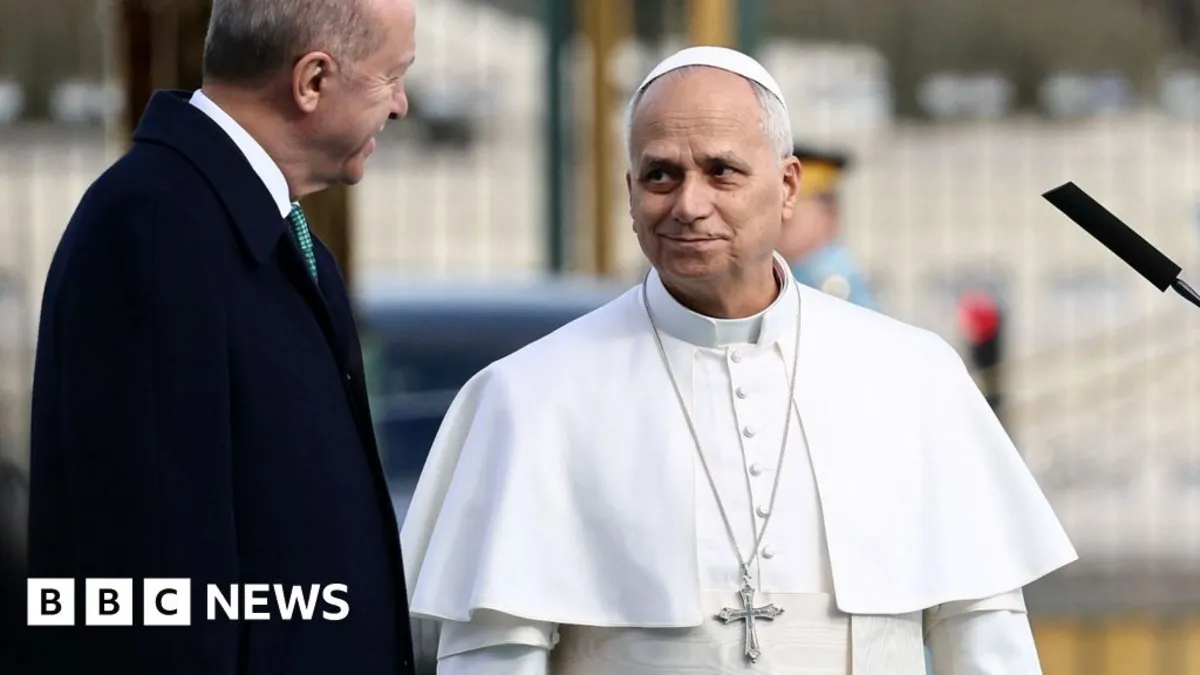
Pope Leo XIV has embarked on his first foreign trip as pontiff, arriving in Turkey to commemorate a significant anniversary in Christian history. Following this visit, he will proceed to Lebanon, a country recently affected by Israeli airstrikes on its capital, Beirut. As he traveled to Ankara, the Pope articulated the primary message of his journey: the importance of unity among all people, regardless of their differences in religion and beliefs.
Originally, the trips to Turkey and Lebanon were planned by the late Pope Francis. However, Pope Leo XIV has embraced the overarching theme of "building bridges," which he has championed since his election in May. Over the past six months, he has maintained a cautious yet measured approach to leadership. This trip, however, will put his diplomatic skills under the spotlight, as he strives to foster interfaith dialogue and understanding.
A significant highlight of the Pope's trip will take place in the town of Iznik, the historical site of the ancient city of Nicaea. Here, Pope Leo and leaders from various Christian denominations will gather to commemorate the 1,700th anniversary of a pivotal church council held in 325 AD. During this council, over 200 bishops affirmed the belief that Jesus is the son of God, leading to the creation of the Nicene Creed. Although Eastern and Western branches of Christianity experienced a dramatic split thereafter, this trip aims to promote messages of unity and healing.
While in Turkey, Pope Leo XIV plans to visit the renowned Blue Mosque, following in the footsteps of his immediate predecessors, Pope Francis and Pope Benedict XVI. His meetings with other religious leaders will serve as a significant gesture of inter-religious dialogue, emphasizing the Vatican's commitment to fostering peace and understanding among different faiths.
The Vatican has confirmed that the Pope's visit to Lebanon will proceed as planned, despite the recent Israeli airstrikes on Beirut. In Lebanon, Pope Leo will meet with faith leaders and engage with young people, aiming to uplift the Christian community, which constitutes about a third of the country's population. This visit is particularly important in light of the ongoing challenges faced by the region.
On the final day of his trip, Pope Leo XIV will celebrate Mass at the Beirut waterfront, a poignant location near the site of the tragic 2020 port explosion that claimed over 200 lives and injured approximately 7,000 others. This Mass will serve as a moment of remembrance and prayer for the victims and will underscore the Pope's commitment to addressing the issues of violence and suffering in the world.
In recent months, Pope Leo XIV has expressed his views on important issues such as the dignity of migrants, yet he has notably refrained from overtly political stances, distinguishing his approach from that of his predecessor. His balanced demeanor has allowed him to appeal to both progressive and traditionalist factions within the Catholic Church. This ability to navigate differing viewpoints is believed to be a reason why cardinals from various backgrounds supported his election during the conclave.
Pope Francis was recognized for his visionary leadership, often prioritizing bold actions over consensus. In contrast, Pope Leo XIV appears dedicated to maintaining a delicate balance between progressive ideals and traditional values. He has consistently called for an end to war, yet his approach diverges from that of Pope Francis, who frequently reached out in support of those suffering in conflict zones. As Pope Leo XIV embarks on this pivotal journey, the world watches closely, anticipating the impact of his message of peace and unity.